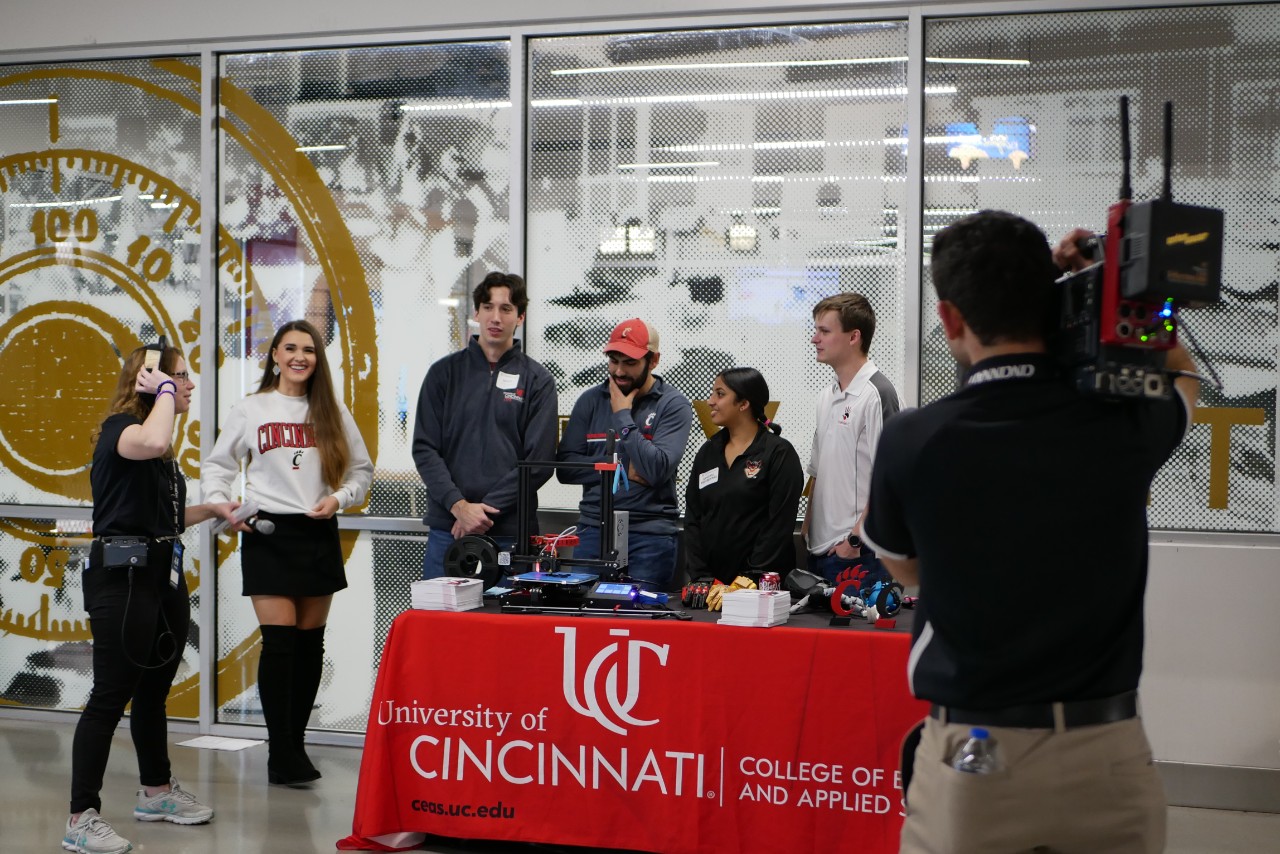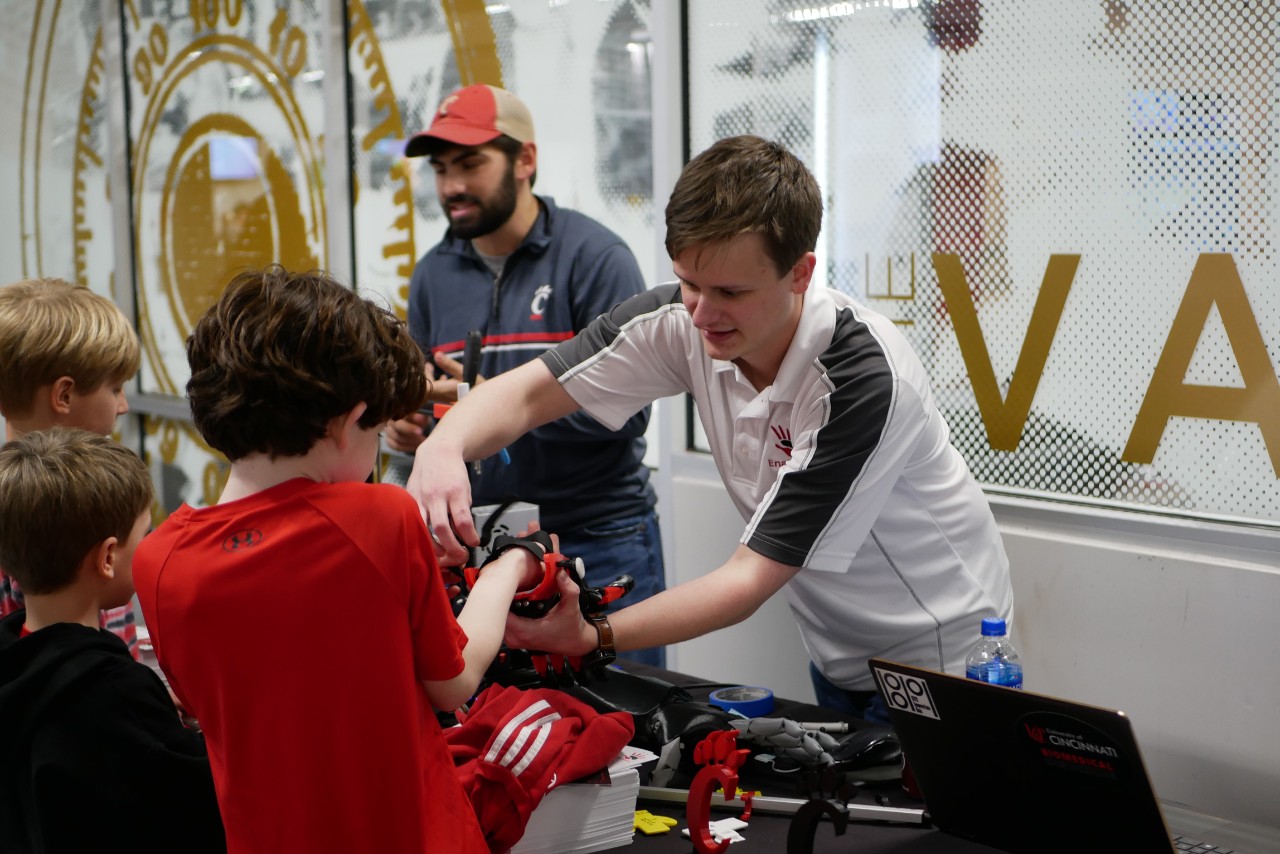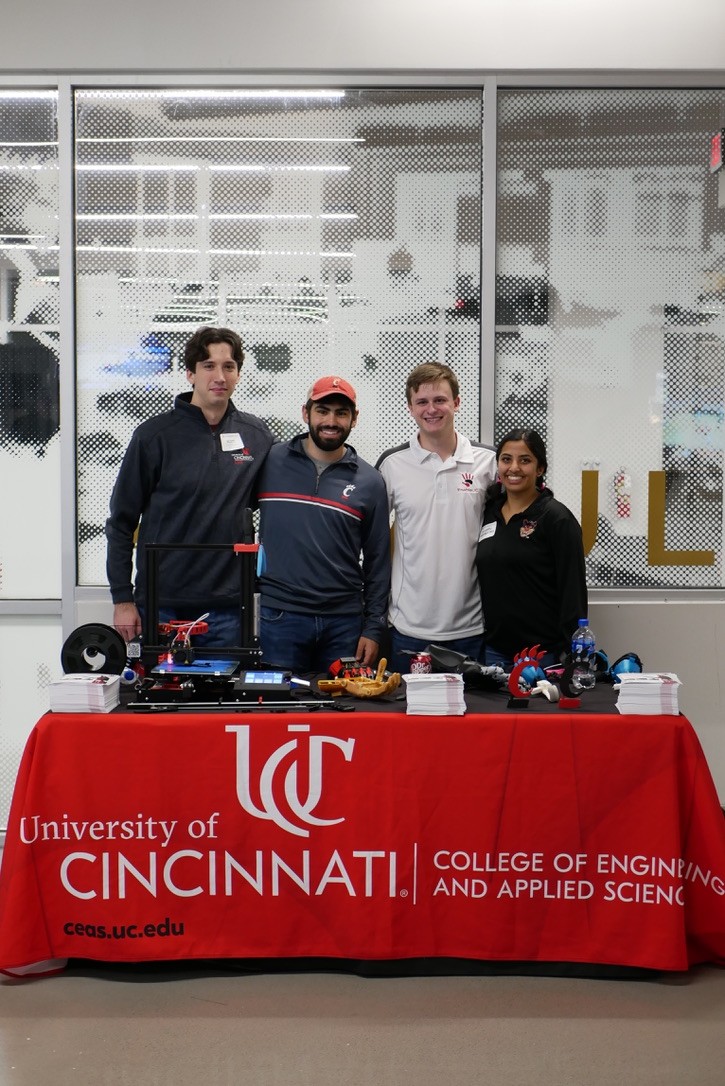
Students are changing veterans' lives with 3D printing technology
UC engineering students create assistive devices to help those with injuries and limb differences
EnableUC, a student-led organization at the University of Cincinnati, has partnered with the Cincinnati Veterans Affairs Medical Center to cheaply and quickly produce customized assistive devices to improve the lives of people with disabilities, limb differences or other injuries.

Zachary Thomas demonstrating one of the EnableUC hands. Photo/Corrie Mayer CEAS Marketing.
"We design and produce 3D printed prosthetics and assistive devices for anyone who needs them, free of charge, said Zachary Thomas, a senior biomedical engineering student in UC's College of Engineering and Applied Science. Thomas is the external vice president of EnableUC.
There is no commercial market for devices like these because each patient's need is unique, depending on their injury or condition. EnableUC, however, can modify existing devices, or design new ones, specifically for these patients.
"It's not a one size fits all. In fact, it's one size fits one person," Thomas said.
All you need is a couple hundred bucks and a wall outlet and you can start 3D printing
Zachary Thomas, EnableUC
The collaboration between the VA and the students of EnableUC has been in the works for several years. The initial connection was made in early 2020 but the pandemic delayed any progress until 2022. From the beginning, the collaboration has been beneficial for both the VA and the students.
"The students are here whenever you need them, and the level of expertise and professionalism is above and beyond what you'd expect," said Jamie Basch, occupational therapist and program coordinator at the VA.
When the VA first got a 3D printer, they realized they would need assistance troubleshooting and maintaining it. Now, EnableUC has a team dedicated to supporting the VA occupational therapy department's 3D printing initiative. The EnableUC VA Computer Aided Design (CAD) team helps the hospital with their 3D printer, while also designing and producing their own assistive devices for patients. Together, the VA and EnableUC CAD team can quickly put solutions into the hands of veterans, something that was not possible before.

EnableUC 3D printer creating UC's C Paw. Photo/Corrie Mayer CEAS Marketing.
Veterans with neurological and physiological injuries often experience motor difficulties, which can make many daily tasks challenging. For example, opening a soda independently can be difficult or impossible for some patients.
"Things like that are very easy for an able-bodied person," said Sumedha Kappaggantula, EnableUC president and senior biomedical engineering student. "For someone with a limb difference or other hindrance in their daily life, this can be extremely challenging and debilitating."
The devices created by EnableUC, in collaboration with input from occupational therapists, give patients the opportunity to reclaim the ability to do these things and exercise greater control of their lives. Thus far, they have created pop tab openers and reaching aids that clip to patients' walkers for the VA, and prosthetic hands for other patients.
Professionally created devices and prosthetics can cost thousands of dollars and take months to customize and create. However, 3D printing is accessible, affordable and offers rapid turnaround time.
"All you need is a couple hundred bucks and a wall outlet and you can start 3D printing," Thomas said.

EnableUC students at CEAS sponsored basketball game. Photo/Corrie Mayer CEAS Marketing.
Since its creation in 2015, EnableUC has used 3D printing to produce and deliver nearly 100 devices to users locally and around the world, including prosthetic hands for a Bolivian boy who was injured in a dynamite blast, and a pink prosthetic hand for a local 5-year-old girl.
Along with improving the lives of patients, the students in EnableUC are also receiving life-changing experiences. Scott Bingham, a third-year biomedical engineering student and lead of the VA CAD team, shared how working with the VA has impacted him.
"Being able to give people another chance is the main reason I am pre-med. This project gives me a reason to work harder in classes I may not want to work at," he said.
After getting his bachelor's in biomedical engineering, Bingham plans to attend medical school to become a physician. His involvement with EnableUC gave him the opportunity to work in a clinical setting which led him to shift his academic focus to pre-med.
It was just one of those things that reminds you why you do this. He had a second hand for the first time in his life
Zachary Thomas, EnableUC
UC places a strong emphasis on real-world learning while in school, including the No. 4-ranked cooperative education (co-op) program.
"The classroom can't replicate that, which is why we have such a big focus here on co-op, and clubs like EnableUC are great because it's real people using our devices," Thomas said.
Thomas' first project with EnableUC was making a prosthetic hand for an elementary-aged student in Texas. He and his team received a video of the child opening his hand on Christmas morning, and after watching the child's reaction, Thomas really fell in love with the organization.
"It was just one of those things that reminds you why you do this. He had a second hand for the first time in his life," Thomas said.
Donate to EnableUC
From young children receiving prosthetic hands to adult veterans receiving assistive devices, the work EnableUC is doing is making real changes for real people, all for free.
Feature image at top: EnableUC students at CEAS sponsored basketball game/Corrie Mayer CEAS Marketing.
Related Stories
Students are changing veterans' lives with 3D printing technology
April 17, 2023
EnableUC, a student-led organization at the University of Cincinnati, has partnered with the Cincinnati Veterans Affairs Hospital to cheaply and quickly produce customized assistive devices to improve the lives of people with disabilities, limb differences or other injuries.
President picks exceptional talent
April 28, 2021
The University of Cincinnati 2021 Presidential Leadership Medal of Excellence Awards honor six undergraduate scholars for scholarship, leadership, character, service and the ideals of the university. Awardees are spotlighted for exceptional academics, creativity, community service and innovation.
Engineering students help track pandemic in Ohio
January 10, 2024
The University of Cincinnati has led a three-year project to monitor COVID-19 in wastewater for the Ohio Department of Health. The surveillance project has helped health officials make early interventions to prevent sick students from spreading the virus across campus.
